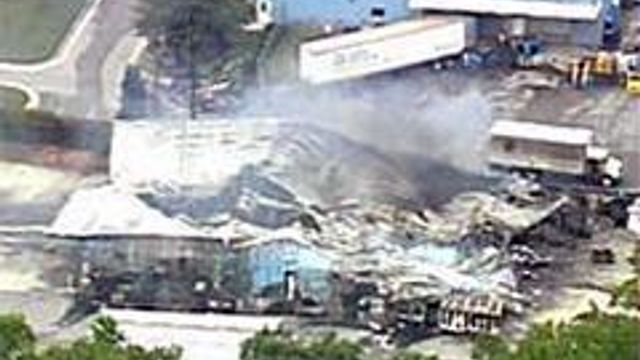Board: Fire Code Needed for Hazardous Waste Sites
Following a 2006 explosion at a hazardous waste transfer facility in Apex, a federal safety board has urged improved fire suppression systems and better record keeping at such sites.
Posted — UpdatedThe recommendations were part of the board's final report on the October 2006 chemical fire at the Environmental Quality Industrial Services plant in Apex.
The chemical board showed a 16-minute video recreation of the Oct. 5, 2006, explosion at the EQ site. The rapidly spreading fire created a plume that Apex officials feared contained toxic chemicals, so they ordered 17,000 residents – more than half the town – to leave their homes.
The fire burned itself out the following day, and residents were allowed to return to their homes two days after the explosion.
No one was seriously hurt in the incident, although 30 people, including 13 first responders, had to seek medical attention.
"The EQ facility was not adequately prepared for a fire that might occur after hours, when no people were present," CSB member William Wark said.
The facility, which collected hazardous materials from businesses and repackaged them for disposal elsewhere, had no fire walls or fire-suppression system to keep fires from spreading, Wark said. The only equipment on the site were hand-held fire extinguishers, which were ineffective with no one around to operate them, he said.
The cause of the fire has never been determined, but the chemical board said last year that oxygen canisters that hadn't been discharged before being removed from airplanes and sent to EQ accelerated the spread of the fire. The board issued a national safety advisory on the handling of the canisters.
The EQ fire was among 23 fires or chemical releases from hazardous waste sites in a five-year period, Wark said. One-third of those incidents required an evacuation, order to seek shelter or traffic detour, he said.
The CSB called for the Environmental Technology Council, the industry association for hazardous waste firms, to work with the National Fire Protection Association on a national fire code for waste facilities.
The chemical board also called for the U.S. Environmental Protection Agency to require waste facilities to periodically give local and state regulators up-to-date records of hazardous materials stored at their sites.
Emergency personnel had difficulty responding to and fighting the EQ fire because the company couldn't provide them with details about the types of chemicals and other materials in the facility.
"Specific, accurate, up-to-date information about chemical hazards is essential to emergency-response planning," Wark said. "Communities have a fundamental right to know about stored hazardous materials that might affect their health and well-being."
State lawmakers last year tightened regulations on hazardous waste facilities, requiring more access to records.
"It's unfortunate that it takes a situation like this to bring it to everyone's attention," said Bob Howington, president of Apex Cabinet Co., which is near the EQ site and was closed for two days after the fire.
Fourth District U.S. Rep. David Price, who represents the Apex area, sent a letter Wednesday to EPA Administrator Stephen Johnson, urging him to adopt the CSB recommendation. Price also said he plans to discuss with federal regulators other safety issues brought to light by the EQ fire, such as creating clear rules for the transport of unspent oxygen canisters.
"Thankfully, it won't be Apex dealing with this, since we no longer have hazardous waste facilities in our town," said Mayor Keith Weatherly, who fought to stop EQ from rebuilding and reopening its facility.
The state Division of Waste Management levied a record $553,225 fine against the company in March 2007, citing previous violations of the company's hazardous waste permit at the site, including unreported fires and chemical leaks.
EQ agreed last fall not to rebuild its Apex site to settle a dispute with state regulators. The company agreed to pay more than $400,000 in penalties, fees and reimbursements to the state.
The company also has paid more than $200,000 in reimbursements to the town and individuals.
• Credits
Copyright 2024 by Capitol Broadcasting Company. All rights reserved. This material may not be published, broadcast, rewritten or redistributed.






